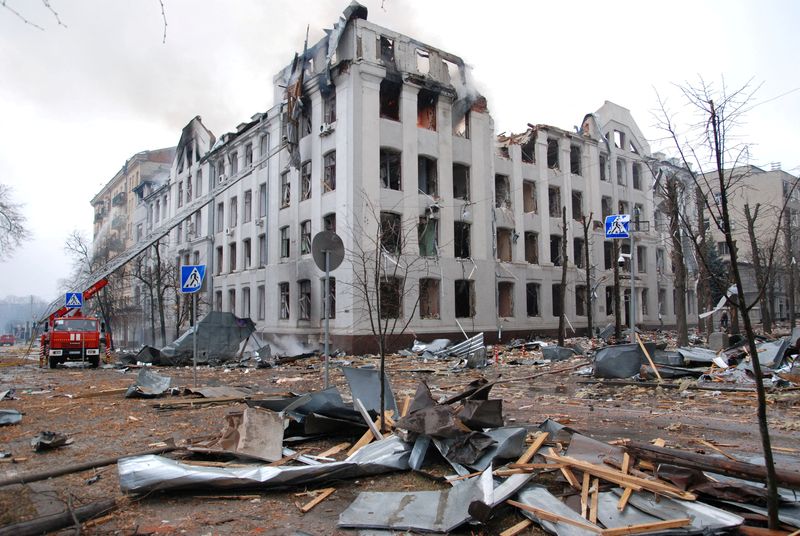KHARKIV, Ukraine (Reuters) - On a residential street in the Ukrainian city of Kharkiv, debris was strewn all around, blood stained the ground and the bodies of people carried from destroyed homes lay covered in blankets.
Some survivors of the barrage by Russian forces sat silently where they could, staring at the carnage. Others helped rescue workers to search the rubble for anyone alive or dead, according to a Reuters witness.
The scenes in Ukraine's second-largest city this week were a reminder of the ferocity of the war in some parts of Ukraine.
While the outskirts of the capital Kyiv to the west have come under shell and missile attack, the fate of Kharkiv, which is geographically and culturally close to Russia, has so far been worse.
According to officials on Wednesday, in the last 24 hours at least 21 people have been killed and 112 wounded in the strategic eastern Ukrainian city, which lies just a few kilometres (miles) from the Russian border on major routes leading north to south and east to west.
Later in the day they said four more had died and nine were wounded as air and rocket strikes continued. Although under siege, Kharkiv has not yet fallen to Russian forces.
At the badly damaged apartment blocks, disbelief mixed with anger.
"They bombed the residential building, hit it with rockets. Many civilians died. I have videos of at least four dead people laying on the ground," said Vitaly Rybas, a local resident.
"A dead person is laying next to us. (Russian Foreign Minister Sergei) Lavrov and (Russian President Vladimir) Putin are ... bandits. They should be brought to justice."
Pools of blood stained roads and pavements as workmen sifted through the wreckage. Firemen and volunteers carried out two bodies wrapped in blankets from the charred stairwells of an apartment block. People peered into craters left by bombs.
"The Russians are shelling us," said Svetlana, who did not give her surname. "We are all scared. Why us? We are ordinary folk."
'ATROCITY' AGAINST CIVILIANS
Fierce fighting outside Kharkiv has helped hold up the Russian advance, according to Ukrainian officials, who shared footage on the day the invasion began that they said showed destroyed or disabled Russian military vehicles and the body of a Russian soldier.
Reuters could not verify the images independently.
Ukrainian President Volodymyr Zelenskiy said on Tuesday that the attacks on Kharkiv amounted to state terrorism, and described the capital Kyiv and Kharkiv as Russia's main targets.
Many Western governments have reacted with dismay to Russia's invasion of Ukraine, and they hope that tough economic sanctions against Moscow will deter it from pressing ahead with what it calls a "special operation" to remove foes in Kyiv.
Events this week in Kharkiv, home to around 1.5 million people, have been singled out for special criticism. British Prime Minister Boris Johnson said on Tuesday the scenes were reminiscent of Serbian shelling of Sarajevo in the 1990s.
"It has that feel to me of an atrocity committed deliberately against a civilian centre," he told a news conference in Estonia.
On Wednesday, long queues formed outside supermarkets and pharmacies as residents of Kharkiv emerged from homes and underground shelters to stock up on supplies.
"Everybody here is outraged," said Maria Zakharova. "Our houses were bombed ... Us and our children ... We cannot even buy bread, can you see that?"

The day before, Russian forces struck at the heart of the historic city - the early capital of Ukraine after it was subsumed into the Soviet Union following World War One - hitting the regional administration building in central Freedom Square.
The blast gutted the imposing, Soviet-era structure and killed several people. In nearby streets, cars had crumpled under the weight of falling masonry. Outside a damaged shop, a Ukrainian and Russian flag fluttered side by side.
